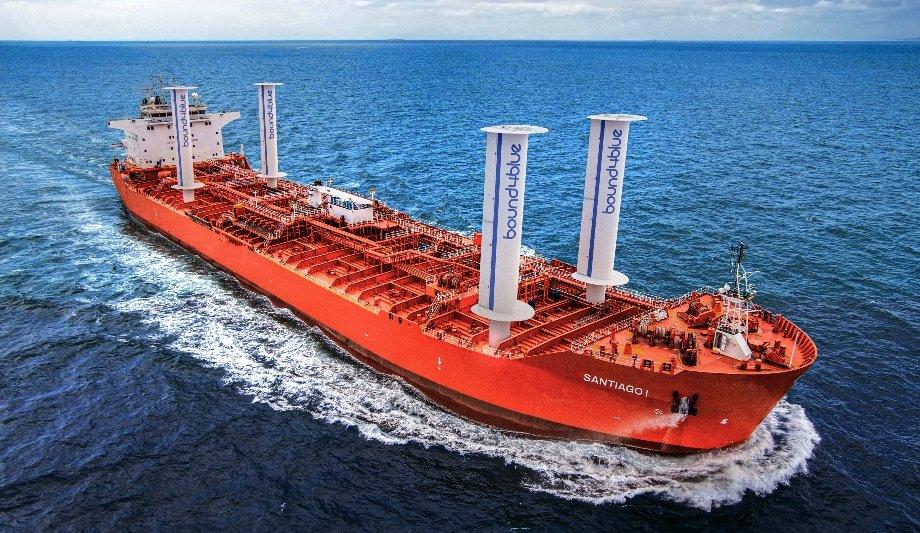Marflet Marine (Marflet), one of Spain’s longest-standing private shipping companies, has signed a contract with bound4blue for the installation of four 22 m eSAILs® on the 49999 DWT oil and chemical tanker Santiago I.
Agreed as part of Marflet’s ongoing decarbonisation strategy, the installation will enable Santiago I to dramatically reduce conventional fuel use, optimising operating costs and cutting GHG emissions.
Autonomous efficiency
The contract makes Marflet the first Spanish merchant fleet owner to adopt a WAP system
The contract, with installation in mid-2025, makes Marflet the first Spanish merchant fleet owner to adopt a WAP system. It marks a further landmark development for bound4blue’s fully autonomous ‘suction sail’ eSAIL® technology, which has recently been selected by other leading industry names including Eastern Pacific Shipping, Louis Dreyfus Company and Odfjell.
Working by dragging air across an aerodynamic surface to generate exceptional propulsive efficiency, the unique system is simple, robust, highly efficient and requires zero operational input from the crew.
Sustainable success
“This is a very significant contract for us, not only because Marflet is the first Spanish shipowner to join the wind revolution, but also because with this contract, we consolidate the tanker segment,” comments José Miguel Bermúdez, CEO, bound4blue. “Having Marflet 'on board' is a source of real pride, signifying that more and more shipowners are realising the great potential of wind as a decarbonising force within the industry."
“The wind revolution is here, and the time is now: as regulations become more stringent and stakeholders demand action to achieve environmental goals, solutions such as our eSAILs® allow owners to harness a natural, clean power source while also realising significant commercial benefits.”
Strong savings
Santiago I should save around 10 and 15% of annual energy consumption
Santiago I, which operates worldwide, will have four ‘model 2’ turnkey eSAIL® units fitted, with Spanish engineering specialist Cotenaval taking charge of tasks including designing the sail foundations and electrical installation. The easy installation of the units provided a key selling point for the shipowner, minimising additional engineering work and limiting downtime when compared to competing emission reduction technologies.
Depending on vessel routeing and operations, and according to detailed modelling, Santiago I should save around 10 and 15% of annual energy consumption with the reduced main engine loads.
Driving down emissions by increasing efficiency
“This contract demonstrates our determination to identify innovative pathways to enhance operational sustainability,” comments Juan Cremades, Fleet Manager at Marflet. “With bound4blue’s eSAILs® onboard, Santiago I has a cost-effective means to optimise fuel efficiency and really drive down emissions, benefiting all our stakeholders. We see huge potential in wind, and we’re thrilled to be the first mover in the Spanish merchant market to adopt such a breakthrough solution. “The Santiago I’s voyage will continue from here. In addition to the suction sail technology, we will now focus on additional ways to reduce underwater radiated noise and further improve both efficiency and safety with advanced weather route analysis.”
bound4blue’s technology is suitable for both newbuilds and retrofitting across the huge majority of vessel segments, including, but not limited to, Tankers, Bulkers, Ro-Ros, Cruises, Ferries, Gas Carriers, and General Cargo vessels. eSAILs® is a powerful means of enhancing compliance with existing and upcoming regulations, including improving vessel CII ratings, boosting EEDI and EEXI, complying with the advent of FuelEU Maritime, and contributing to saved allowances within the EU Emissions Trading Scheme.














